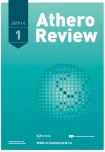-
Medical journals
- Career
The effect of alirocumab on cardiovascular events: What did the ODYSSEY OUTCOMES Trial show?
Authors: Petr Ošťádal
Authors‘ workplace: Komplexní kardiovaskulární centrum, Nemocnice Na Homolce, Praha
Published in: AtheroRev 2019; 4(1): 53-60
Category: clinical studies
Overview
Patients after acute coronary syndrome (ACS) remain at high risk for other cardiovascular (CV) events even when all the measures within secondary prevention are used. The ODYSSEY OUTCOMES Trial tested the effects of proprotein convertase subtilisin/kexin type 9 inhibitor (PCSK9) in patients with ACS, who had higher cholesterol levels remaining despite high-dose statin therapy (LDL-cholesterol > 1.8 mmol/L). The study included 18,924 individuals who were randomized to receive alirocumab therapy or placebo. The dose of alirocumab was blindly adjusted to achieve an LDL-cholesterol value of 0.6–1.3 mmol/L. The median follow-up was 2.8 years. Alirocumab significantly reduced the risk of another CV event (primary composite endpoint death from coronary heart disease, non-fatal myocardial infarction, ischemic stroke, unstable angina) by 15%. Treatment with alirocumab was also associated with lower total mortality. Alirocumab not only reduced the risk of the first CV event, but also subsequent events. The effects of alirocumab were the most pronounced in subgroups with the highest initial LDL-cholesterol value (> 2.6 mmol/L) and in patients treated with alirocumab for more than 3 years. Treatment with alirocumab was safe, only a local reaction at the injection site was a more common adverse effect of alirocumab compared to placebo. In coclusion, alirocumab, when added to intensive statin therapy in patients with ACS, significantly reduced the risk of recurrent CV event, and treatment with alirocumab was associated with lower total mortality.
Keywords:
alirocumab – mortality – unstable angina – acute coronary syndrome
Sources
- Schwartz GG, Bessac L, Berdan LG et al. Effect of alirocumab, a monoclonal antibody to PCSK9, on long-term cardiovascular outcomes following acute coronary syndromes: rationale and design of the ODYSSEY outcomes trial. Am Heart J 2014; 168(5): 682–689. Dostupné z DOI: <http://dx.doi.org/10.1016/j.ahj.2014.07.028>.
- Schwartz GG, Steg PG, Szarek M et al. Alirocumab and Cardiovascular Outcomes after Acute Coronary Syndrome. N Engl J Med 2018; 379(22): 2097–2107. Dostupné z DOI: <http://dx.doi.org/10.1056/NEJMoa1801174>.
- Szarek M, White HD, Schwartz GG et al. Alirocumab Reduces Total Nonfatal Cardiovascular and Fatal Events: The ODYSSEY OUTCOMES Trial. J Am Coll Cardiol 2019; 73(4): 387–396. Dostupné z DOI: <http://dx.doi.org/10.1016/j.jacc.2018.10.039>.
- Schwartz GG, Szarek MM, Bhatt DL et al. Alirocumab Reduces Risk of Death after Acute Coronary Syndrome in Patients with Persistently Elevated Atherogenic Lipoproteins on Intensive Statin Treatment. Circulation 2018; 138(25): E772–E773 (Abstr. 20008). In: Late-Breaking Science Abstracts From the American Heart Association’s Scientific Sessions 2018 and Late-Breaking Abstracts in Resuscitation Science From the Resuscitation Science Symposium 2018. Circulation 2018; 138(25): E751–E782. Dostupné z DOI: <http://doi 10.1161/CIR.0000000000000636>.
Labels
Angiology Diabetology Internal medicine Cardiology General practitioner for adults
Article was published inAthero Review

2019 Issue 1-
All articles in this issue
- Severe mixed dyslipidemia as a manifestation of hematological disease: case report
- The effect of alirocumab on cardiovascular events: What did the ODYSSEY OUTCOMES Trial show?
- Nutraceuticals with hypolipidemic effect in clinical practice: a summary statement of the International expert panel of lipidologists prepared by the committee of the Czech society for atherosclerosis
- An initiative to establish apheresis centers: indications for and performance of lipoprotein apheresis in the Czech Republic
- Lysosomal acid lipase deficiency in differential diagnosis of familial hypercholesterolemia
- Therapy of dyslipidaemia in patient with muscular dystrophy: case report
- Psoriasis as a risk factor for cardiovascular events: case report
- Intensive management of dyslipidemia in very high-risk patients with PCSK9 inhibitors
- Athero Review
- Journal archive
- Current issue
- Online only
- About the journal
Most read in this issue- Nutraceuticals with hypolipidemic effect in clinical practice: a summary statement of the International expert panel of lipidologists prepared by the committee of the Czech society for atherosclerosis
- Lysosomal acid lipase deficiency in differential diagnosis of familial hypercholesterolemia
- Therapy of dyslipidaemia in patient with muscular dystrophy: case report
- Psoriasis as a risk factor for cardiovascular events: case report
Login#ADS_BOTTOM_SCRIPTS#Forgotten passwordEnter the email address that you registered with. We will send you instructions on how to set a new password.
- Career

